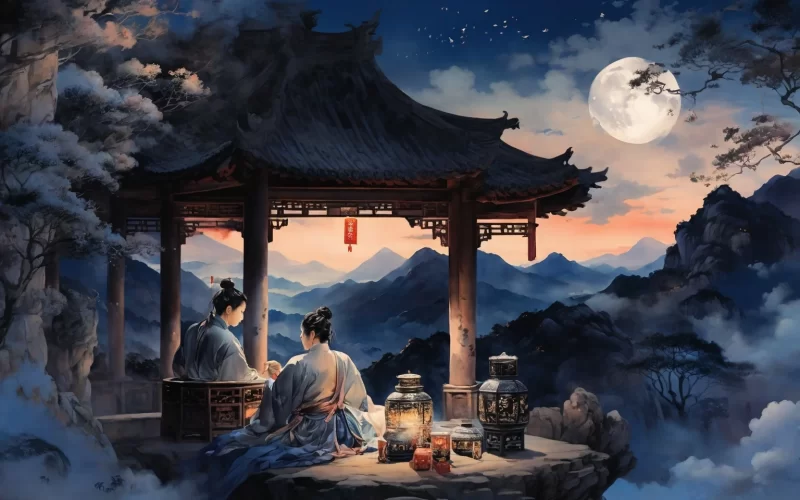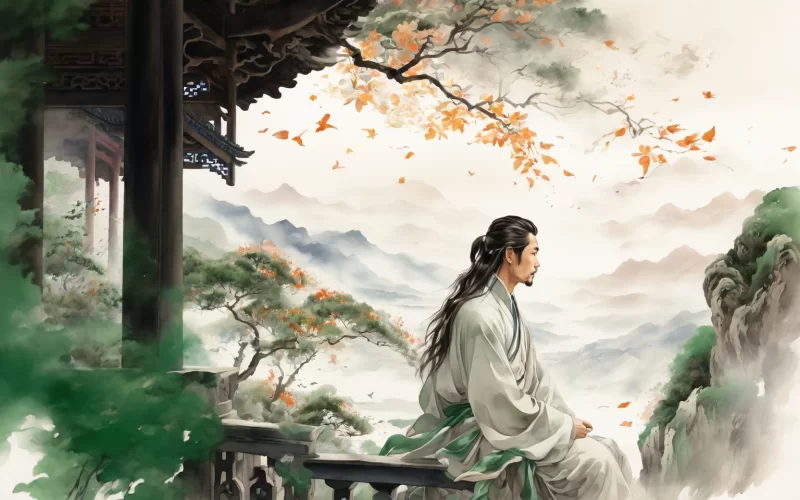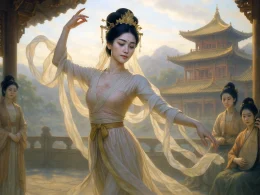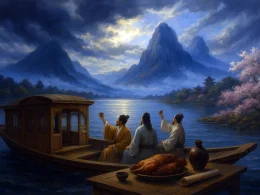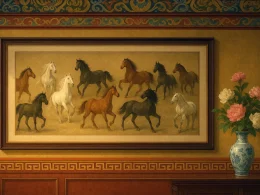We’ll wash away the woe of a thousand years;
We’ll linger to drink a hundred cups of wine.
What a fine night to have a heart-to-heart talk!
Under the bright moonlight we can’t go to bed.
Drunk, we lie in the empty mountain;
Heaven and earth are our quilt and pillow.
Original Poem
「友人会宿」
李白
涤荡千古愁,留连百壶饮。
良宵宜清谈,皓月未能寝。
醉来卧空山,天地即衾枕。
Interpretation
Composed during Li Bai's seclusion on Mount Lu, this poem reflects his lifelong pursuit of achievement amid repeated setbacks. After being summoned to Chang'an by Emperor Xuanzong during the Tianbao era (742–756 CE) with high hopes of assisting governance, Li Bai's unyielding nature and refusal to flatter powerful officials led to his dismissal through slander. Wandering thereafter, he retained ambition but never realized political aspirations, harboring inevitable frustration. During his Mount Lu retreat, he sought solace in landscape and wine, using nature's vastness and wine's mild intoxication to ease inner turmoil. This poem, born from such context, expresses both bold liberation through drink and unspoken regret over unfulfilled dreams, alongside yearning for cosmic harmony.
First Couplet: "涤荡千古愁,留连百壶饮。"
Dídàng qiāngǔ chóu, liúlián bǎi hú yǐn.
Cleanse eternal sorrow's residue; Lingering through a hundred brews.
The opening elevates personal grief to historical scale. "Eternal sorrow" transcends individual frustration, touching life's essence and time's passage. "A hundred brews" exaggerates consumption to confront spiritual eternity with material abundance, showing resolute defiance.
Second Couplet: "良宵宜清谈,皓月未能寝。"
Liángxiāo yí qīngtán, hàoyuè wèi néng qǐn.
This fine night invites refined discourse; Under bright moonlight, sleep finds no force.
Here bold drinking transitions to intellectual exchange. "Refined discourse" differs from mundane chat, concerning philosophy and art—echoing Wei-Jin scholars' elegance. "Bright moonlight" symbolizes pure ideals and perpetual realms. Sleeplessness reflects Li Bai's pursuit of life's density and spiritual intensity.
Third Couplet: "醉来卧空山,天地即衾枕。"
Zuì lái wò kōng shān, tiāndì jí qīn zhěn.
Drunk, I recline in empty mountains; Heaven and earth become my bedding.
This couplet peaks in spiritual realm, fully displaying Li Bai's romanticism and Daoist thought. "Empty mountains" signify mental clarity after rejecting worldly noise. "Heaven and earth become my bedding" breaks subject-object boundaries, merging the poet with the cosmos—a grand, tranquil sense of belonging.
Holistic Appreciation
The poem outlines a clear path to spiritual transcendence: starting with the motive to "cleanse sorrow," progressing through "unrestrained drinking," ascending to "refined discourse," and culminating in "drunken cosmic unity." This shows not passive escape but active life choices and spiritual construction. For Li Bai, wine becomes a medium to spiritual freedom; drunkenness symbolizes sacred communion with cosmic spirit beyond social norms. Beneath its bold surface lies a profound soul seeking ultimate peace.
Artistic Merits
- Cosmic Scaling of Emotion: Images like "eternal sorrow," "hundred brews," and "heaven-earth bedding" elevate personal feeling to cosmic dimensions, possessing philosophical grandeur.
- Layered Sublimation: The poem progresses from material drinking to intellectual exchange, then to cosmic unity, completing a spiritual ascent from mundane to sublime.
- Harmonized Exaggeration: "Hundred brews" exaggerates quantity; "heaven-earth bedding" exaggerates realm—yet these hyperboles serve genuine emotion and lofty pursuit, achieving shocking harmony.
- Poetic Daoist Expression: The poem vividly poeticizes Zhuangzi's concept of "communing with heaven and earth's spirit," transforming abstract philosophy into tangible aesthetic realm.
Insights
This poem offers a paradigm for seeking infinite meaning within finite life. When confined by social values' "small system," one may leap into nature's "large system" to reorient oneself. Li Bai's "drunken mountain reclining" is essentially a superior spiritual strategy—by minimizing self within cosmos, he gains maximal freedom and peace. In our era of material abundance and spiritual anxiety, this wisdom is precious: we needn't truly flee cities but can cultivate an "empty mountain" within, allowing our minds to "recline" thereon when needed, healing worldly constraints with cosmic breadth. True transcendence means embracing cosmos while dwelling in mundane world.
About the poet

Li Bai (李白), 701 - 762 A.D., whose ancestral home was in Gansu, was preceded by Li Guang, a general of the Han Dynasty. Tang poetry is one of the brightest constellations in the history of Chinese literature, and one of the brightest stars is Li Bai.






